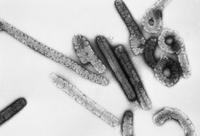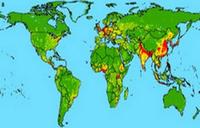-
First successful vaccination against “mad cow”-like chronic wasting disease (CWD) in deer
Researchers say that a vaccination they have developed to fight a brain-based, wasting syndrome among deer and other animals may hold promise on two additional fronts: protecting U.S. livestock from contracting the disease, and preventing similar brain infections in humans. Their study documents a scientific milestone: The first successful vaccination of deer against chronic wasting disease (CWD), a fatal brain disorder caused by unusual infectious proteins known as prions. Prions propagate by converting otherwise healthy proteins into a disease state. Equally important, this study may hold promise against human diseases suspected to be caused by prion infections, such as Creutzfeldt-Jakob disease, kuru, familial insomnia, and variably protease-sensitive prionopathy.
-
-
FBI's investigation of 2001 anthrax attacks was flawed: GAO
In a report released Friday, the Government Accounting Office (GAO) says the FBI relied on flawed scientific methods to investigate the 2001 anthrax attacks which killed five people and sent seventeen others to hospitals. The report raises questions about the FBI’s firm conclusion that it was Army biodefense specialist Bruce Ivins was responsible – or solely responsible – for the attacks.
-
-
Could the Sydney siege have been predicted and prevented?
It’s the question everyone is asking — could the Sydney siege have been predicted and therefore prevented based on the past behavior of gunman Man Haron Monis. Monis’s troubled history was well known to media and the police, but can we predict if and when such a person is likely to commit any further crimes? Further, we need to be very careful about stereotyping the mentally ill as potentially “dangerous.” It is simply not the case that all people with serious mental illnesses are prone to violence. There are very specific factors that govern the complex relationship between mental illness and violence. We need to understand and prevent people from experiencing them.
-
-
Improved protective suit for Ebola caregivers
An advanced protective suit for health care workers who treat Ebola patients, devised by a Johns Hopkins University team, is one of the first five awardees in a federal funding contest aimed at quickly devising new tools to combat the deadly disease. The JHU prototype is designed to do a better job than current garments in keeping health care workers from coming in contact with Ebola patients’ contagious body fluids, both during treatment and while removing a soiled suit. In addition, it is expected to keep the wearer cooler — an important benefit in hot, humid regions such as West Africa.
-
-
Preventing animal-borne diseases from affecting humans

Roughly 75 percent of newly emerging diseases are zoonotic, which means that they can spread from animals to humans. Incredibly damaging, these diseases usually wreak havoc on humans, who rarely have natural defenses to protect them against such strains. About 2.7 million people die each year from zoonotic diseases. It is estimated that between 1997 and 2009, the cost of dealing with and treating these types of diseases around the world amounted roughly $80 billion. Scientists hope that by connecting human medical and veterinary science, and by organizing and establishing different medical professionals along a spectrum of disease detection, it would be possible to thwart the outbreak of another zoonotic disease.
-
-
Murder charges against leaders of compounding company whose adulterated product killed 64
In the fall of 2012, 751 people in twenty states fell ill and sixty-four died from a fungal meningitis outbreak shortly after receiving injections of preservative-free methylprednisolone acetate produced at the New England Compounding Center (NECC), a Massachusetts-based compounding pharmacy. Fourteen people connected to NECC are facing a 131-count indictment, with Barry Cadden, co-founder of the company, and Glenn Adam Chin, a pharmacist who ran the sterile room, facing second-degree murder charges.
-
-
The growing economic cost of infectious diseases
Emerging pandemic disease outbreaks such as Ebola increasingly threaten global public health and world economies, scientists say. We can expect five new such diseases each year, into the future. We should also expect them to spread. The tropical disease dengue fever, for example, has made its way to Florida and Texas, seemingly to stay. Five new such diseases expected each year; strategies to reduce climate change adaptable to infectious diseases. Economists, disease ecologists, and others collaborated on an in-depth economic analysis of strategies to address pandemic threats in a proactive way — rather than a reactive response to a crisis.
-
-
Mecca faces severe air pollution during annual pilgrimage

Dangerously high levels of air pollutants are being released in Mecca during the hajj, the annual holy pilgrimage in which millions of Muslims on foot and in vehicles converge on the Saudi Arabian city, according to findings of a new study. “Hajj is like nothing else on the planet. You have 3 to 4 million people — a whole good-sized city — coming into an already existing city,” said one researcher. “The problem is that this intensifies the pollution that already exists. We measured among the highest concentrations our group has ever measured in urban areas — and we’ve studied seventy-five cities around the world in the past two decades.”
-
-
U.S. Army seeking to end environmental testing at Indiana nuclear firing range
The U.S. Army wants to end its Nuclear Regulatory Commission (NRC) license at the Jefferson Proving Ground in southern Indiana. The Army’s appeal comes after years of water and soil testing at the site. Currently, an estimated 162,040 pounds of depleted uranium projectiles and shows are still on the firing range. The site was last used in 1995. Uranium munitions, specifically the kind used to penetrate armor during Operation Desert Shield, were used there throughout the 1980s and 1990s.
-
-
Link between power lines and ill-health called into question

Several past studies have suggested that the magnetic fields created by phones, high-voltage power lines, and other electrical equipment are harmful for humans. Research first carried out in the 1970s and again subsequently, found an association between people living near overhead power lines and an increased risk of childhood leukemia, and the International Agency for Research on Cancer has categorized low frequency magnetic fields as “possibly carcinogenic.” A mechanism for this association has never been found, and now a research team studying the effects of weak magnetic fields (WMFs) on key human proteins, including those crucial for health, found that they have no detectable impact.
-
-
Can a hacker stop your car or your heart? Security and the Internet of Things
An ever-increasing number of our consumer electronics is Internet-connected. We’re living at the dawn of the age of the Internet of Things. Appliances ranging from light switches and door locks, to cars and medical devices boast connectivity in addition to basic functionality. The convenience can’t be beat, but the security and privacy implications cannot and should not be ignored. There needs to be a concerted effort to improve security of future devices. Researchers, manufacturers and end users need to be aware that privacy, health and safety can be compromised by increased connectivity. Benefits in convenience must be balanced with security and privacy costs as the Internet of Things continues to infiltrate our personal spaces.
-
-
Texas Ebola task force calls for revamping state’s preparations for epidemics
The Texas Task Force on Infectious Disease Preparedness and Responsehas called for the establishment of two specialized Ebola treatment centers in Texas, and for new methods to monitor vulnerable health care workers, especially those returning from West Africa.The state acknowledges that it alone is unable to handle an infectious disease outbreak like Ebola. The task force wants federal health and disease authorities to provide actionable information during disease outbreaks.
-
-
Tech investors turning to agriculture as a safe bet
Investors and entrepreneurs are turning their sights toward the world of farming, seeing the next decades as especially challenging for because of the need to feed the expected ten billion people who will then people the planet. The technologies that these companies are investing in include not just the expected hallmarks of advanced efficient farming — robot workers, better software, and food substitute technology — but also farmland itself.Manysee the investment as a more solid and safer relative one amidst to the much more volatile tech prospects. “Farmland is more of a safe way to invest your savings,” says one investor. “Farmland isn’t going to disappear. Dropbox could disappear.”
-
-
World can be separated into seven regions for vectored human diseases

Researchers have for the first time mapped human disease-causing pathogens, dividing the world into a number of regions where similar diseases occur. The findings show that the world can be separated into seven regions for vectored human diseases — diseases which are spread by pests, like mosquito-borne malaria — and five regions for non-vectored diseases, like cholera.
-
-
World's response to Ebola slow, inconsistent, inadequate: Médecins sans Frontières
The NGO Médecins sans Frontières (MSF) has harshly criticized the international community for its slow and inconsistent response to the Ebola crisis in West Africa. MSF says the world’s response risks creating “a double failure” because ill-equipped locals in Sierra Leone, Liberia, and Guinea have been left to run hospitals and treatment centers. MSF international president, Dr. Joanne Liu, said it was “extremely disappointing that states with biological-disaster response capacities have chosen not to deploy them.”
-
More headlines
The long view
We Ran the C.D.C.: Kennedy Is Endangering Every American’s Health
Nine former leaders of the Centers for Disease Control and Prevention (CDC), who served as directors or acting directors under Republican and Democratic administrations, serving under presidents from Jimmy Carter to Donald Trrump, argue that HHS Secretary Roert F. Kennedy Jr. poses a clear and present danger to the health of Americans. He has placed anti-vaxxers and conspiracy theorists at top HHS positions, and he appears to be guided by a hostility to science and a belief in bizarre, unscientific approaches to public health.
